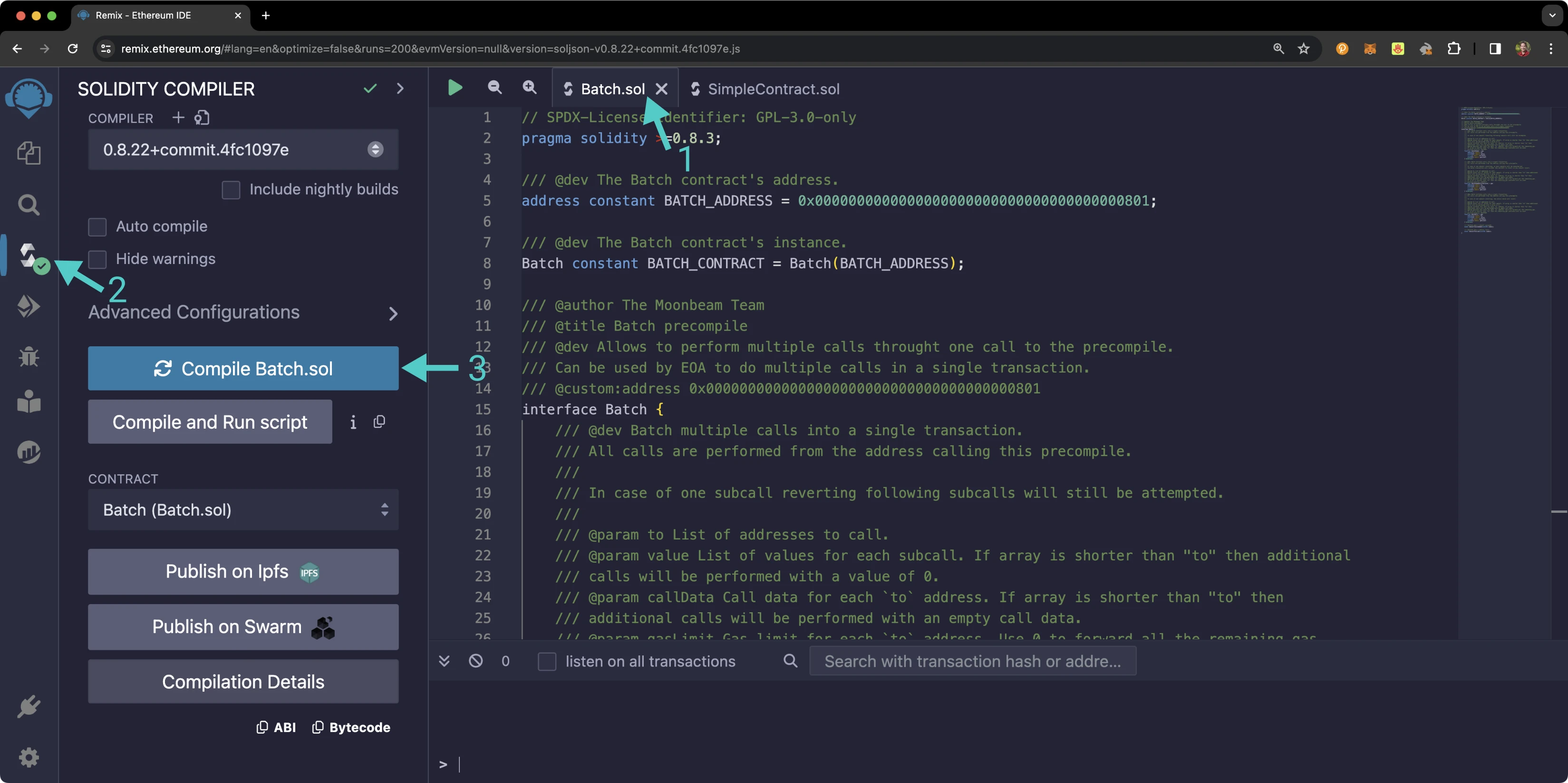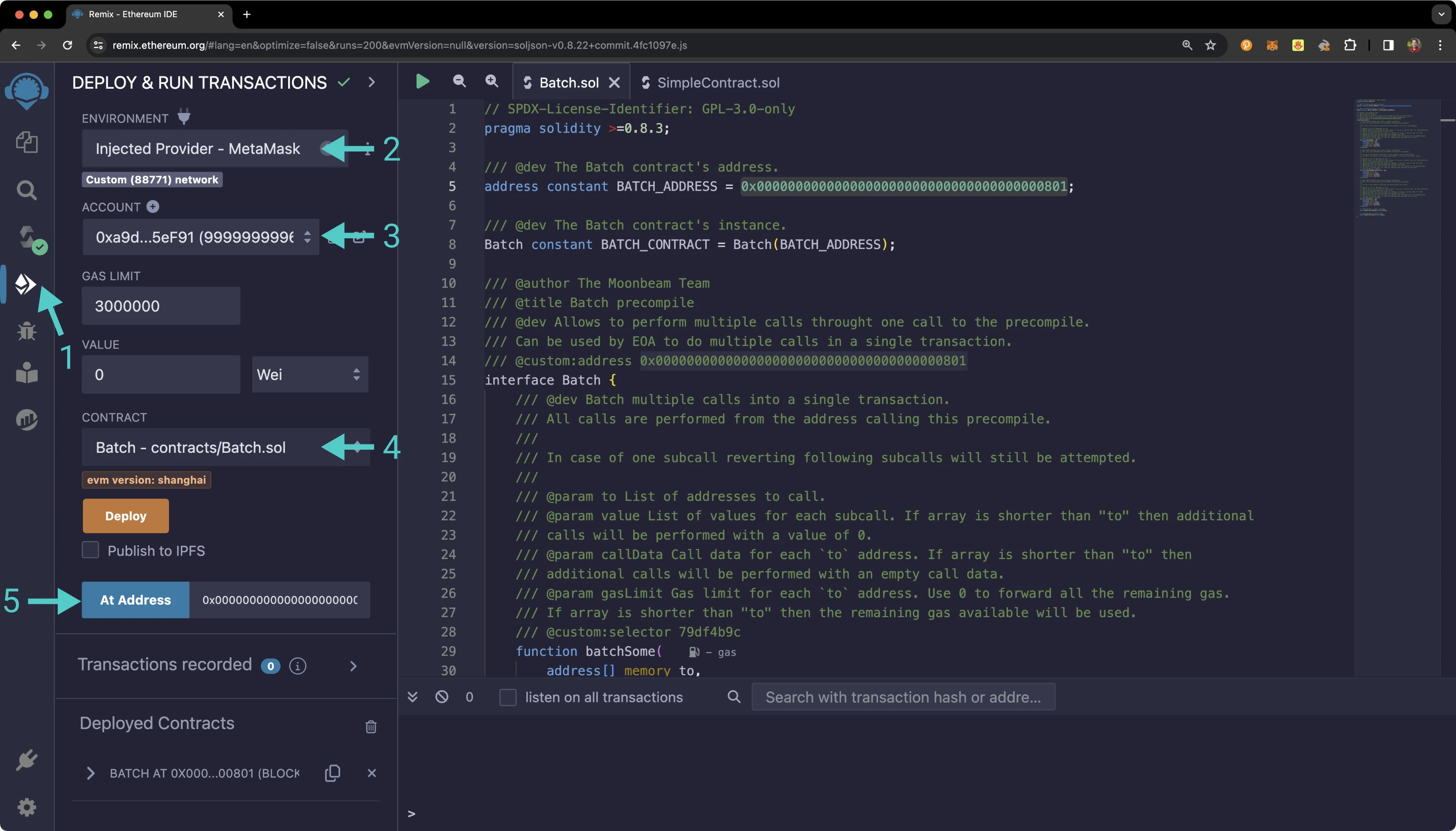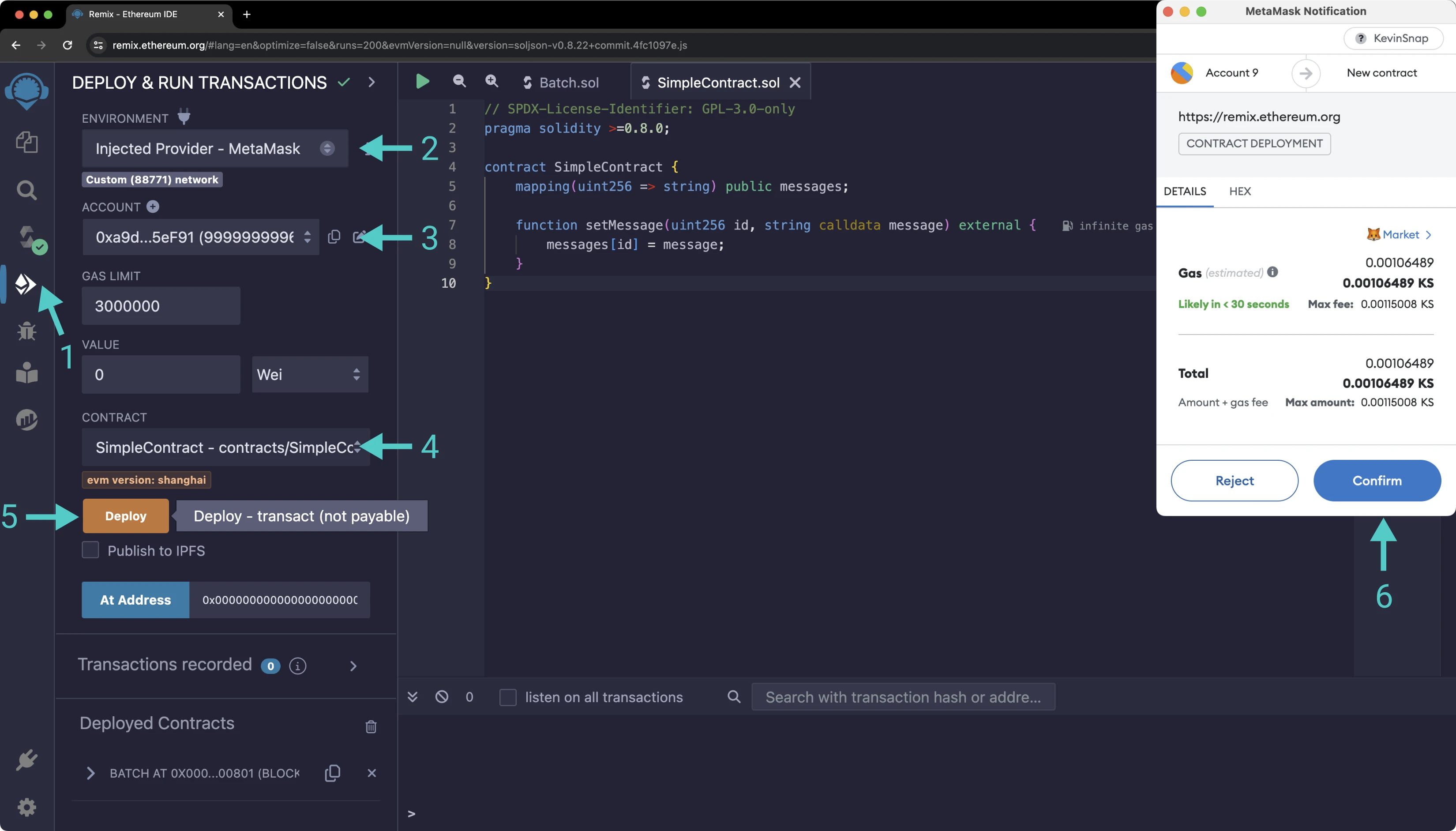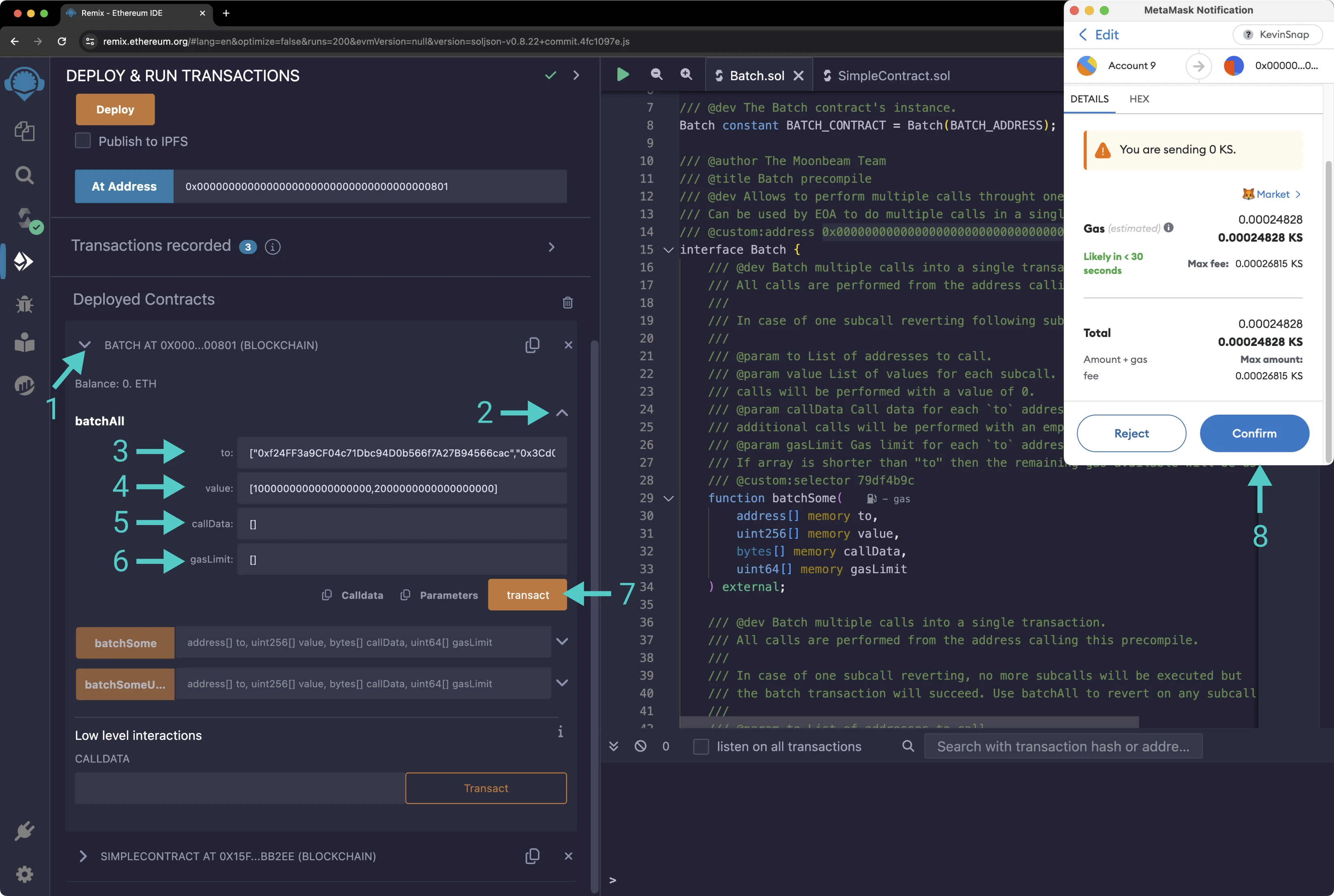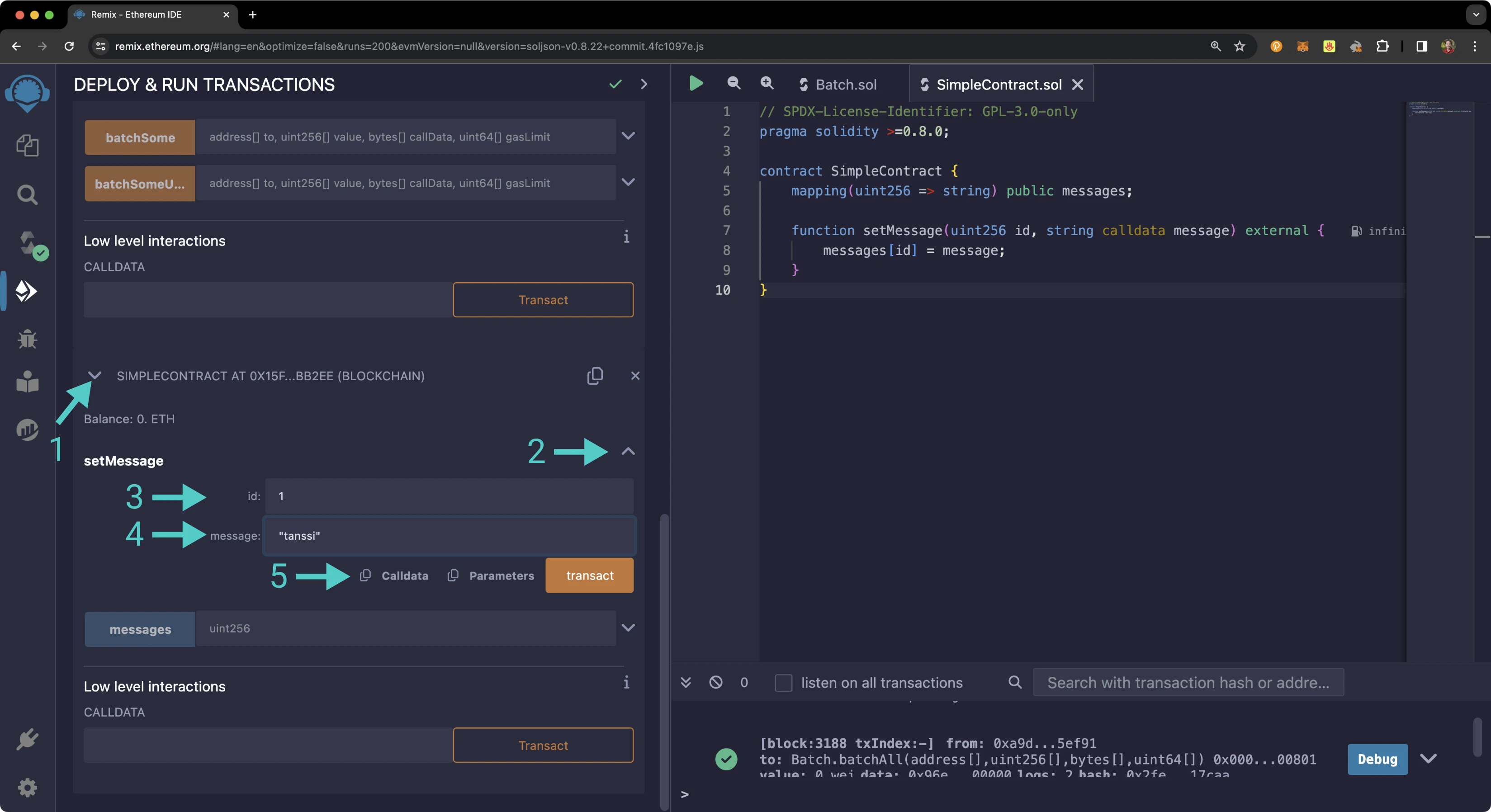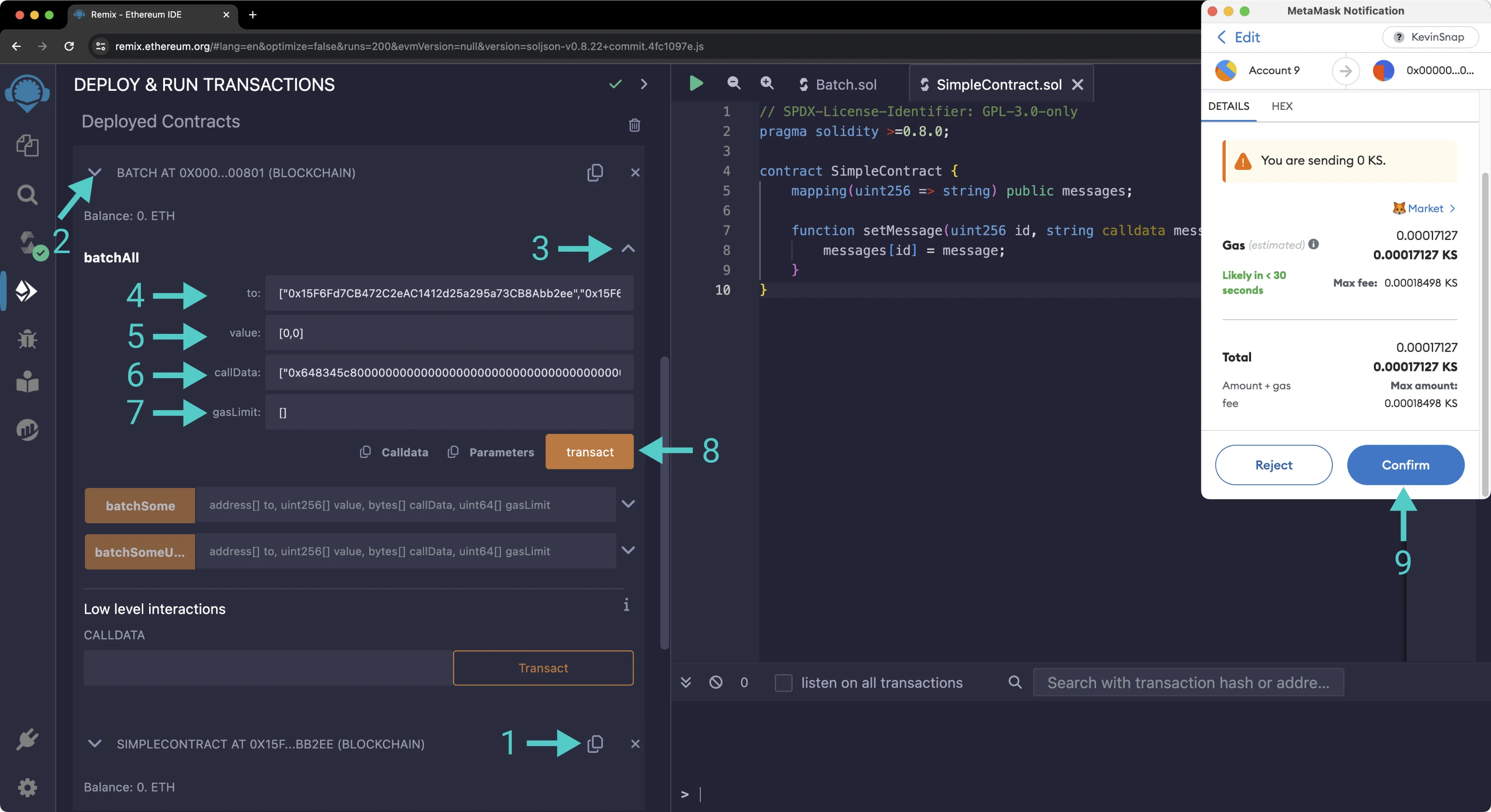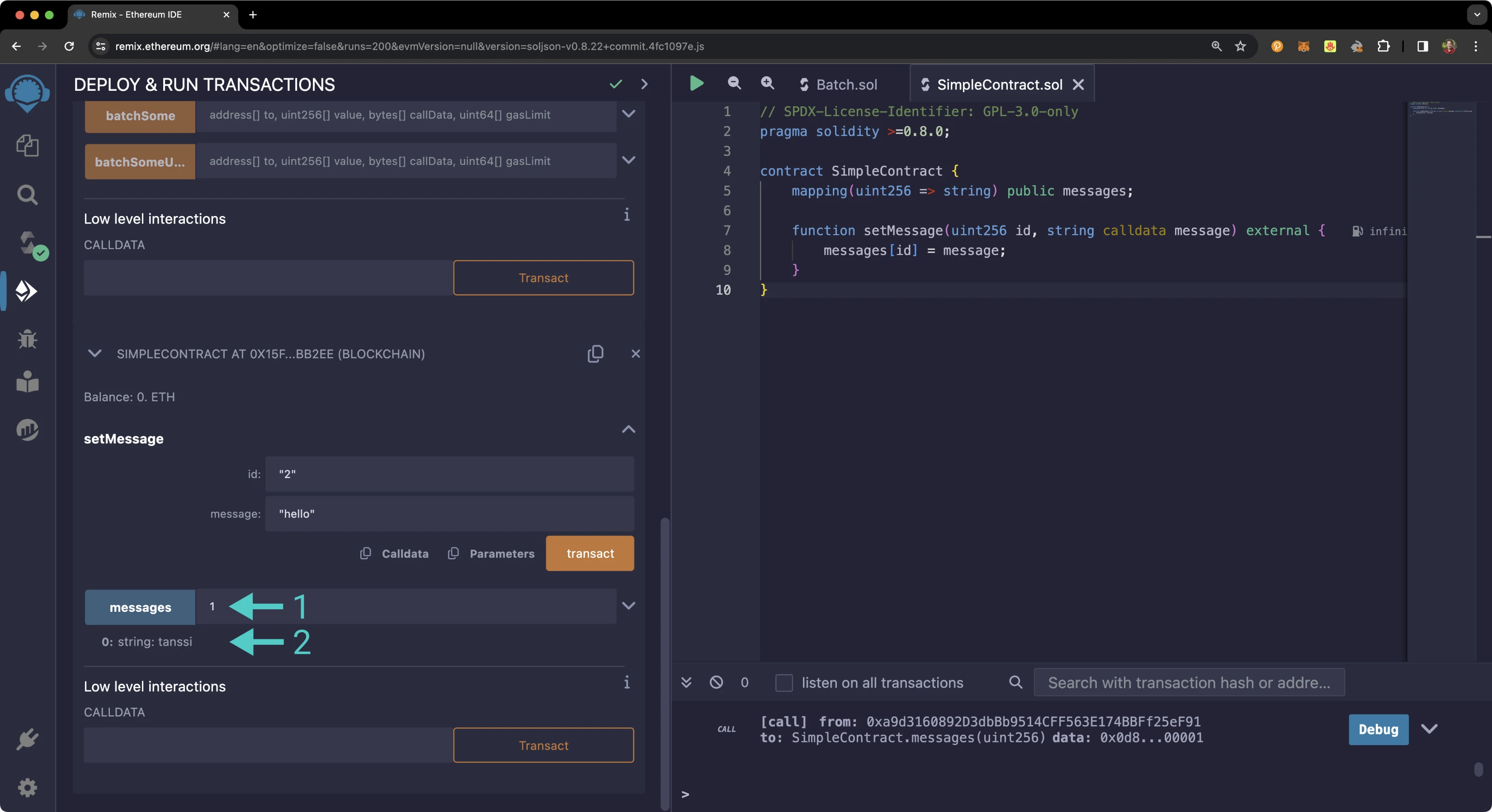Interacting with the Batch Precompile¶
Introduction¶
The Batch Precompile contract on Tanssi-powered EVM networks allows developers to combine multiple EVM calls into one.
Currently, having users interact with multiple contracts would require multiple transaction confirmations in the user's wallet. An example would be approving a smart contract's access to a token and then immediately transferring it. With the Batch Precompile, developers can enhance user experience with batched transactions as it minimizes the number of transactions a user is required to confirm. Additionally, the gas fees paid by a user can be reduced since batching avoids multiple base gas fees (the initial 21000 units of gas spent to begin a transaction).
The precompile interacts directly with Substrate's EVM pallet. The caller of the batch function will have their address act as the msg.sender for all subtransactions, but unlike delegate calls, the target contract will still affect its own storage. It is effectively the same as if the user signed multiple transactions but with only one confirmation.
The Batch Precompile is located at the following address:
0x0000000000000000000000000000000000000801
Note
There can be some unintended consequences when using precompiles. Tanssi's precompiles are derived from Moonbeam's, and as such, please familiarize yourself with Moonbeam's Precompile Security Considerations.
The Batch Solidity Interface¶
Batch.sol is a Solidity interface that allows developers to interact with the precompile's three methods.
Batch.sol
// SPDX-License-Identifier: GPL-3.0-only
pragma solidity >=0.8.3;
/// @dev The Batch contract's address.
address constant BATCH_ADDRESS = 0x0000000000000000000000000000000000000801;
/// @dev The Batch contract's instance.
Batch constant BATCH_CONTRACT = Batch(BATCH_ADDRESS);
/// @author The Moonbeam Team
/// @title Batch precompile
/// @dev Allows to perform multiple calls throught one call to the precompile.
/// Can be used by EOA to do multiple calls in a single transaction.
/// @custom:address 0x0000000000000000000000000000000000000801
interface Batch {
/// @dev Batch multiple calls into a single transaction.
/// All calls are performed from the address calling this precompile.
///
/// In case of one subcall reverting following subcalls will still be attempted.
///
/// @param to List of addresses to call.
/// @param value List of values for each subcall. If array is shorter than "to" then additional
/// calls will be performed with a value of 0.
/// @param callData Call data for each `to` address. If array is shorter than "to" then
/// additional calls will be performed with an empty call data.
/// @param gasLimit Gas limit for each `to` address. Use 0 to forward all the remaining gas.
/// If array is shorter than "to" then the remaining gas available will be used.
/// @custom:selector 79df4b9c
function batchSome(
address[] memory to,
uint256[] memory value,
bytes[] memory callData,
uint64[] memory gasLimit
) external;
/// @dev Batch multiple calls into a single transaction.
/// All calls are performed from the address calling this precompile.
///
/// In case of one subcall reverting, no more subcalls will be executed but
/// the batch transaction will succeed. Use batchAll to revert on any subcall revert.
///
/// @param to List of addresses to call.
/// @param value List of values for each subcall. If array is shorter than "to" then additional
/// calls will be performed with a value of 0.
/// @param callData Call data for each `to` address. If array is shorter than "to" then
/// additional calls will be performed with an empty call data.
/// @param gasLimit Gas limit for each `to` address. Use 0 to forward all the remaining gas.
/// If array is shorter than "to" then the remaining gas available will be used.
/// @custom:selector cf0491c7
function batchSomeUntilFailure(
address[] memory to,
uint256[] memory value,
bytes[] memory callData,
uint64[] memory gasLimit
) external;
/// @dev Batch multiple calls into a single transaction.
/// All calls are performed from the address calling this precompile.
///
/// In case of one subcall reverting, the entire batch will revert.
///
/// @param to List of addresses to call.
/// @param value List of values for each subcall. If array is shorter than "to" then additional
/// calls will be performed with a value of 0.
/// @param callData Call data for each `to` address. If array is shorter than "to" then
/// additional calls will be performed with an empty call data.
/// @param gasLimit Gas limit for each `to` address. Use 0 to forward all the remaining gas.
/// If array is shorter than "to" then the remaining gas available will be used.
/// @custom:selector 96e292b8
function batchAll(
address[] memory to,
uint256[] memory value,
bytes[] memory callData,
uint64[] memory gasLimit
) external;
/// Emitted when a subcall succeeds.
event SubcallSucceeded(uint256 index);
/// Emitted when a subcall fails.
event SubcallFailed(uint256 index);
}
The interface includes the following functions:
batchSome(address[] to, uint256[] value, bytes[] callData, uint64[] gasLimit) — performs multiple calls, where the same index of each array combine into the information required for a single subcall. If a subcall reverts, following subcalls will still be attempted
to- an array of addresses to direct subtransactions to, where each entry is a subtransactionvalue- an array of native currency values to send in the subtransactions, where the index corresponds to the subtransaction of the same index in the to array. If this array is shorter than the to array, all the following subtransactions will default to a value of 0callData- an array of call data to include in the subtransactions, where the index corresponds to the subtransaction of the same index in the to array. If this array is shorter than the to array, all of the following subtransactions will include no call datagasLimit- an array of gas limits in the subtransactions, where the index corresponds to the subtransaction of the same index in the to array. Values of 0 are interpreted as unlimited and will have all remaining gas of the batch transaction forwarded. If this array is shorter than the to array, all of the following subtransactions will have all remaining gas forwarded
batchSomeUntilFailure(address[] to, uint256[] value, bytes[] callData, uint64[] gasLimit) — performs multiple calls, where the same index of each array combine into the information required for a single subcall. If a subcall reverts, no following subcalls will be executed
to- an array of addresses to direct subtransactions to, where each entry is a subtransactionvalue- an array of native currency values to send in the subtransactions, where the index corresponds to the subtransaction of the same index in the to array. If this array is shorter than the to array, all the following subtransactions will default to a value of 0callData- an array of call data to include in the subtransactions, where the index corresponds to the subtransaction of the same index in the to array. If this array is shorter than the to array, all of the following subtransactions will include no call datagasLimit- an array of gas limits in the subtransactions, where the index corresponds to the subtransaction of the same index in the to array. Values of 0 are interpreted as unlimited and will have all remaining gas of the batch transaction forwarded. If this array is shorter than the to array, all of the following subtransactions will have all remaining gas forwarded
batchAll(address[] to, uint256[] value, bytes[] callData, uint64[] gasLimit) — performs multiple calls atomically, where the same index of each array combine into the information required for a single subcall. If a subcall reverts, all subcalls will revert
to- an array of addresses to direct subtransactions to, where each entry is a subtransactionvalue- an array of native currency values to send in the subtransactions, where the index corresponds to the subtransaction of the same index in the to array. If this array is shorter than the to array, all the following subtransactions will default to a value of 0callData- an array of call data to include in the subtransactions, where the index corresponds to the subtransaction of the same index in the to array. If this array is shorter than the to array, all of the following subtransactions will include no call datagasLimit- an array of gas limits in the subtransactions, where the index corresponds to the subtransaction of the same index in the to array. Values of 0 are interpreted as unlimited and will have all remaining gas of the batch transaction forwarded. If this array is shorter than the to array, all of the following subtransactions will have all remaining gas forwarded
The interface also includes the following required events:
- SubcallSucceeded(uint256 index) - emitted when a subcall of the given index succeeds
- SubcallFailed(uint256 index) - emitted when a subcall of the given index fails
Interact with the Solidity Interface¶
Checking Prerequisites¶
To follow along with this tutorial, you will need to have your wallet configured to work with your EVM network and an account funded with native tokens. You can add your EVM network to MetaMask with one click on the Tanssi dApp. Or, you configure MetaMask for Tanssi with the demo EVM network.
Example Contract¶
The contract SimpleContract.sol will be used as an example of batching contract interactions, but in practice, any contract can be interacted with.
// SPDX-License-Identifier: GPL-3.0-only
pragma solidity >=0.8.0;
contract SimpleContract {
mapping(uint256 => string) public messages;
function setMessage(uint256 id, string calldata message) external {
messages[id] = message;
}
}
Remix Set Up¶
You can interact with the Batch Precompile using Remix. You'll need a copy of Batch.sol and SimpleContract.sol. To add the precompile to Remix and follow along with the tutorial, you will need to:
- Click on the File explorer tab
- Paste the
Batch.solcontract into a Remix file named Batch.sol - Paste the
SimpleContract.solcontract into a Remix file named SimpleContract.sol
Compile the Contract¶
Next, you will need to compile both files in Remix:
- Make sure that you have the Batch.sol file open
- Click on the Compile tab, second from top
- To compile the contract, click on Compile Batch.sol
If the interface was compiled successfully, you will see a green checkmark next to the Compile tab.
Access the Precompile¶
Instead of deploying the Batch Precompile, you will access the interface given the address of the precompiled contract:
- Click on the Deploy and Run tab directly below the Compile tab in Remix. Please note that the precompiled contract is already deployed
- Make sure Injected Provider - MetaMask is selected in the ENVIRONMENT dropdown. Once you select Injected Provider - MetaMask, you might be prompted by MetaMask to connect your account to Remix
- Make sure the correct account is displayed under ACCOUNT
- Ensure Batch.sol is selected in the CONTRACT dropdown. Since this is a precompiled contract, there is no need to deploy any code. Instead, we are going to provide the address of the precompile in the At Address field
- Provide the address of the Batch Precompile:
0x0000000000000000000000000000000000000801and click At Address
The BATCH precompile will appear in the list of Deployed Contracts.
Deploy Example Contract¶
On the other hand, SimpleContract.sol will be deployed as a new contract. Before starting this section, repeat the compilation step with the SimpleContract.sol file.
- Click on the Deploy and Run tab directly below the Compile tab in Remix
- Make sure Injected Provider - MetaMask is selected in the ENVIRONMENT dropdown. Once you select Injected Provider - MetaMask, you might be prompted by MetaMask to connect your account to Remix
- Make sure the correct account is displayed under ACCOUNT
- Ensure SimpleContract is selected in the CONTRACT dropdown
- Click Deploy
- Confirm the MetaMask transaction that appears by clicking Confirm
The SIMPLECONTRACT contract will appear in the list of Deployed Contracts.
Send Native Currency via Precompile¶
Sending native currency with the Batch Precompile involves more than pressing a few buttons in Remix or MetaMask. For this example, you will be using the batchAll function to send native currency atomically.
Transactions have a value field to specify the amount of native currency sent. In Remix, this is determined by the VALUE input in the DEPLOY & RUN TRANSACTIONS tab. However, for the Batch Precompile, this data is provided within the value array input of the batch functions.
Try transferring the native token of your network to two wallets of your choice via the Batch Precompile:
- Expand the batch contract under Deployed Contracts
- Expand the batchAll function
- For the to input, insert your addresses in the following format:
["INSERT_ADDRESS_1", "INSERT_ADDRESS_2"], where the first address corresponds to the first wallet of your choice and the second address corresponds to the second wallet of your choice - For the value input, insert the amount you wish to transfer in Wei for each address. For example,
["1000000000000000000", "2000000000000000000"]will transfer 1 native token to the first address and 2 native tokens to the second address - For callData, insert
[]. Call data is not relevant for simply transferring the native token - For the gasLimit inputs, insert
[] - Press transact
- Press Confirm in the MetaMask extension to confirm the transaction
Once the transaction is complete, you can check both of the accounts' balances, either in MetaMask or in your network's block explorer, a link to which can be found on the Tanssi dApp. Congratulations! You've now sent a batched transfer via the Batch Precompile.
Note
Typically if you wanted to send the native currency to or through a contract, you would have to set the value within the overall transaction object and interact with a payable function. However, since the Batch Precompile interacts directly with Substrate code, this is not a typical Ethereum transaction and is thus not necessary.
Find a Contract Interaction's Call Data¶
Visual interfaces like Remix and handy libraries like Ethers.js hide the way that Ethereum transactions interact with Solidity smart contracts. The name and input types of a function are hashed into a function selector and the input data is encoded. These two pieces are then combined and sent as the transaction's call data. To send a subtransaction within a batch transaction, the sender needs to know its call data beforehand.
Try finding a transaction's call data using Remix:
- Expand the
SimpleContract.solcontract under Deployed Contracts - Expand the setMessage function
- Enter the desired id, such as
1 - Enter the desired message, such as
"tanssi" - Instead of sending the transaction, click the copy button next to the transact button to copy the call data
Now you have the transaction's call data! Considering the example values of 1 and "tanssi", we can keep an eye out for their encoded values in the call data:
0x648345c8 // function selector
0000000000000000000000000000000000000000000000000000000000000001 // 1 id
0000000000000000000000000000000000000000000000000000000000000040 // 32 byte offset
000000000000000000000000000000000000000000000000000000000000000 // 32 byte length
674616e7373690000000000000000000000000000000000000000000000000000 // "tanssi" in bytes
The call data can be broken into five lines where:
- The first line is the function selector
- The second line is equal to 1, which is the id that was provided
- What's left involves the message input. These last three lines are tricky since strings are a dynamic type with a dynamic length. The third line refers to an offset to define where the string's data starts. The fourth line refers to the length of the message in the following line, which is 32 bytes total - the "tanssi" message plus padding
You can repeat the above steps to capture the call data for values of 2 and "hello" such that multiple subcalls can be submitted atomically with the Batch Precompile in the next section.
Function Interaction via Precompile¶
This section's example will be using the batchAll function that will ensure the transactions are resolved atomically. Keep in mind that there are also two other batch functions that can either continue subtransactions despite errors or halt subsequent subtransactions but not revert previous ones.
Interacting with a function is very similar to sending a native currency, since they are both transactions. However, call data is required to provide input to functions properly and a sender may desire to limit the amount of gas spent in each subtransaction.
The callData and gasLimit fields are more relevant for subtransactions that interact with contracts. For each function in the batch interface, the callData input is an array where each index corresponds to the call data for each recipient of the subtransaction, that is, each to input. If the size of the callData array is less than the to array, the remaining subtransactions will have no call data (functions with no inputs). The gasLimit input is an array that corresponds to the amount of gas that each can spend for each subtransaction. If its value at an index is 0 or the index is the size of the array or greater (and smaller than the to array's size), all of the remaining gas from the previous subtransaction is forwarded.
To use the precompile to send an atomic batch transaction combining two contract interactions, take the following steps:
- Copy the
SimpleContract.solcontract's address with the copy button on the right side of its header. Be sure also to have the call data from the previous section - Expand the batch contract under Deployed Contracts
- Expand the batchAll function
- For the to input, paste the address
SimpleContract.solas follows:["INSERT_SIMPLE_CONTRACT_ADDRESS","INSERT_SIMPLE_CONTRACT_ADDRESS"]. Note that you'll need to repeat the address for as many transactions you are batching together, even if the contract address is the same - For the value input, since
SimpleContract.soldoes not require any native currency to be paid to it, insert[0,0]for 0 Wei - For the callData input, insert your call data from the previous section in the following format:
["INSERT_FIRST_CALL_DATA","INSERT_SECOND_CALL_DATA"] - For the gasLimit input, insert
[]. You can put in a gas limit value for each subcall, or leave it as an empty array - Press transact
- Press Confirm in the MetaMask extension to confirm the transaction
If you used the same call data as the tutorial, you can check to make sure that the transaction has been successful as follows:
- Expand the
SimpleContract.solcontract under Deployed Contracts - To the right of the messages button, insert
1 - Press the blue messages button
The phrase "tanssi" should appear underneath it. You can repeat the above steps with an id of "2", and you should see "hello". Congratulations! You have interacted with a function with the Batch Precompile.
Combining Subtransactions¶
So far, transferring native currency and interacting with functions have been separate, but they can be intertwined.
The following four strings can be combined as inputs for a batch transaction. They will send 1 native token to the public Gerald (0x6Be02d1d3665660d22FF9624b7BE0551ee1Ac91b) account and interact with a predeployed SimpleContract.sol contract twice. Here is a break-down:
There are three subtransactions which correspond to three addresses in the to input array. The first is the public Gerald account and the following two are a SimpleContract.sol contract. You can replace the last two with your own instance of SimpleContract.sol if you wish. Or, replace only one: you can interact with multiple contracts in a single message.
[
"0x6Be02d1d3665660d22FF9624b7BE0551ee1Ac91b",
"0xd14b70a55F6cBAc06d4FA49b99be0370D0e1BD39",
"0xd14b70a55F6cBAc06d4FA49b99be0370D0e1BD39"
]
There will also be three values for the value array. The first address in the to input array indicates 1000000000000000000 wei or 1 UNIT of the native token. Remember that the native tokens of Tanssi-powered EVM networks have 18 decimal points just like Ethereum. The following two values are 0 because the function that their subtransactions are interacting with does not accept or require native currency.
["1000000000000000000", "0", "0"]
You will need three values for the callData array. Since transferring native currency does not require call data, the string is simply blank. The second and third values in the array correspond to invocations of setMessage that set messages to IDs 5 and 6.
[
"0x",
"0x648345c8000000000000000000000000000000000000000000000000000000000000000500000000000000000000000000000000000000000000000000000000000000400000000000000000000000000000000000000000000000000000000000000009796f752061726520610000000000000000000000000000000000000000000000",
"0x648345c800000000000000000000000000000000000000000000000000000000000000060000000000000000000000000000000000000000000000000000000000000040000000000000000000000000000000000000000000000000000000000000000e61206d6f6f6e6265616d2070726f000000000000000000000000000000000000"
]
The final input is for gas_input. This array will be left empty to forward all remaining gas to each subtransaction.
[]
Try sending a batched transaction with these inputs in Remix the same way you batched a function call.
And that's it! You've successfully interacted with the ERC-20 precompile using MetaMask and Remix!
Ethereum Development Libraries¶
If you have followed the Ethers.js tutorial, you may find it difficult to find the call data for a function. The answer is hidden within Ether's Interface object, where the encodeFunctionData function allows you to input your function name and inputs to receive the resultant call data. Web3.js has a similar function, encodeFunctionCall.
Note
The code snippets presented in the following sections are not meant for production environments. Please make sure you adapt it for each use case.
// Import the contract ABI
const { abi } = require('./INSERT_ABI_PATH');
// Use ABI to create an interface
const yourContractInterface = new ethers.Interface(abi);
// Find call data for the setMessage function
const callData = yourContractInterface.encodeFunctionData(
'INSERT_FUNCTION_NAME',
[
'INSERT_INPUT_1',
'INSERT_INPUT_2',
// ...
]
);
// Import the contract ABI
const { abi } = require('./INSERT_ABI_PATH');
// Find call data for the setMessage function
const callData = web3.eth.abi.encodeFunctionCall(abi, [
'INSERT_INPUT_1',
'INSERT_INPUT_2',
// ...
]);
# Import the ABI and bytecode
from compile import abi, bytecode
# Create contract instance
your_contract = web3.eth.contract(abi=abi, bytecode=bytecode)
# Encode the contract call
call_data = your_contract.encodeABI(
fn_name="INSERT_FUNCTION_NAME", args=["INSERT_INPUT_1", "INSERT_INPUT_2", ...]
)
Afterwards, you should be all set to interact with the Batch Precompile as one typically would with a contract in Ethers.
| Created: January 31, 2024
